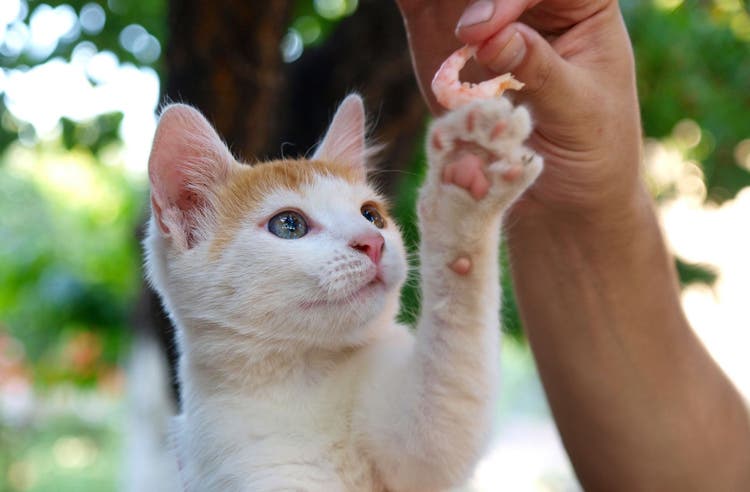
Can Cats Eat Shrimp?
Cat owners commonly wonder about the toxicity of various human foods. The question about the safety of different foods increased after learning that certain foods were toxic which yielded a lot of press coverage. The most important toxic foods to cats are onions, garlic, chocolate, alcohol, and excessive amounts of fish.
Exposure to the dangers of various human foods has encouraged pet owners to ask about the safety of foods such as can cats eat shrimp. Learn more about what cats can and can’t eat in this article: The Ultimate Guide to What Cats Can’t Eat.
Can Cats Eat Shrimp?
The answer to can cats eat cooked shrimp is yes they can. Shrimp can be prepared plain, steamed, grilled, sautéed, baked, boiled, or broiled. Cats love the soft to firm texture, flavor, and smell of the shrimp and can enjoy it as a healthy snack. Shrimp is a good source of protein, phosphorous, selenium, choline, copper, iodine and vitamin B12.
A shrimp, commonly referred to as a prawn, is an animal classified as decapod crustaceans that live in the water. There are thousands of species that serve as an important food source to various ocean animals including various species of fish. Shrimp has an elongated body, strong tails, and most commonly move by swimming. The tails of shrimp are a common delicacy for human consumption and the commercial shrimp industry is estimated to be over a 50 billion dollar a year business.
The Dangers of Shrimp to Cats
When researching the safety of shrimp for cats, there are five considerations that impact the danger.
- Pancreatitis or gastrointestinal upset can occur in cats that aren’t used to shrimp or after ingestion of shrimp cooked with seasonings and butter. Too much oil, fat, or seasoning can lead to gastrointestinal upset or pancreatitis.
- There is a risk of choking or esophageal foreign bodies from the tails (shell).
- Ingestion of large amounts of fish tails can cause gastrointestinal upset and constipation.
- Raw shrimp can contain various bacteria that can infect cats (and you) such as E.Coli, salmonella and/or listeria which can cause symptoms of infection.
- Some cats may be allergic to shrimp.
To answer the question, “Can cats eat shrimp?” The answer is, “Yes.”
If your cat ingested shrimp and is showing symptoms such as trouble swallowing, vomiting, diarrhea, not eating or lethargy, please call your veterinarian or closest emergency clinic.
IMPORTANT NOTE: Any food can cause gastrointestinal upset in cats. What may not cause illness in one cat may create sickness in another cat.
Do Cats Need Shrimp?
There is nothing in shrimp that cats require however shrimp is a very good source of protein and nutrients and is a primary ingredient in some cats foods. The most important thing to do is to ensure your cat is eating a good quality cat food. Learn more about the nutritional needs of cats.
The Safest Way to Give Shrimp to Cats
The safest way to give shrimp to your cat is to offer a small amount of unseasoned deveined cooked shrimp. If feeding shrimp to your cat as a treat, ½ of a shrimp is plenty for a small cat and 1 shrimp for a large sized cat.
Can Cats Be Allergic to Shrimp?
Cats can have food allergies including to shrimp. The most common food allergens in cats are beef, chicken, and dairy. Symptoms of allergies in cats can include skin itching and skin infections.
Additional Articles that May be of Interest About Can Cats Eat Shrimp
- The Ultimate Guide to What Cats Can’t Eat
- Can Cats Eat Watermelon
- Can Cats Eat Yogurt?
- Can Cats Eat Potatoes?
- Can Cats Eat Bananas?
- Can Cats Eat Eggs?
- Can Cats Eat Grapes?
- Can Cats Eat Peanut Butter?
- Can Cats Eat Strawberries?
- Instructions for Homemade Cat Treats
- Is Sweetener Toxic to Cats?
- Dangerous Foods: Are They Harmful to Your Cat?
- Grape and Raisin Toxicity in Dogs
- The Good and Bad of Rawhides
- Peanut Butter Toxicity in Dogs